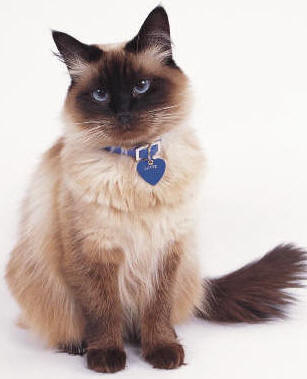Feeding Cats for Optimal Health
by Dr. Rachel Addleman, DVM, DiplABVP, CVA
Veterinarian and Certified Veterinary Acupuncturist, Dr. Addleman has advanced training and Board Certification in
feline medicine. She practices in Houston, Texas and can be found at
AnimalFixer.com
 Obesity
is the most common health problem in cats. One of the reasons is the TYPE
of food being fed, not necessarily the number of calories. Cats are desert
creatures and are true carnivores. In nature, cats eat mice, birds,
reptiles, and bugs to build a healthy diet. Dogs and people are omnivores,
meat and plant eaters.
Obesity
is the most common health problem in cats. One of the reasons is the TYPE
of food being fed, not necessarily the number of calories. Cats are desert
creatures and are true carnivores. In nature, cats eat mice, birds,
reptiles, and bugs to build a healthy diet. Dogs and people are omnivores,
meat and plant eaters.
Cats are unable to properly digest carbohydrates. Most dry foods have high
carbohydrate levels due to the grain that is required to form the product.
A young healthy cat should be eating a diet similar to his wild cousins –
one that is high in protein, high in fats, and low in carbohydrates. A
mouse is composed of about 40-45% protein, 40-45% fat, and only 3-5%
carbohydrates.
High carbohydrate diets may cause obesity and health problems.
Carbohydrates cause overproduction of insulin, increased hunger, and weight
gain. There are health concerns related to this weight gain, not the least
of which is diabetes. A cat with a high carbohydrate diet often has a
flakey coat (some owners think this is dandruff) or some may be greasy.
Overweight cats often are not able to groom as well, sometimes culminating
in poor bathroom grooming behaviors. Weight can affect your cat’s joints
causing them to forgo jumping, or they may be less willing to play. It is
not uncommon to have an obese cat newly diagnosed with diabetes who can be
converted to a non diabetic state just by altering the diet. The key is to
significantly decrease the carbohydrate content in their diet and begin a
slow weight loss program.
Cats are desert creatures and in nature derive a large portion of their
water from the food they eat. Canned food has a much higher water content than dry food. Cats should be
encouraged to drink fresh water daily, with the use of kitty fountains or
running water taps, to properly dilute their urine.
There is little evidence to suggest that dry food plays a significant role
in maintaining oral health. The research suggesting that dry food is better
for oral health was done on dogs, not cats. A cat’s jaw does not go
side-to-side as a person’s would, so there can be no true chewing. Cats use
their teeth in the wild to catch and tear their food, and in the process
mechanically clean their teeth. The food pieces are then swallowed whole.
Commercial dry kibble is throat sized, so our domestic cats have little
opportunity to rip and tear into their food! Canned foods have much lower
levels of carbohydrates because they lack the grain needed to process the
dry kibble. There are many good commercial brands of canned foods
available. If your cat does not like canned food, there are brands of dry
kibble that are lower in carbohydrates. During your cat’s physical exam
pre-existing medical conditions, sex, breed, and age are evaluated to allow
for specific diet recommendations for your cat.
